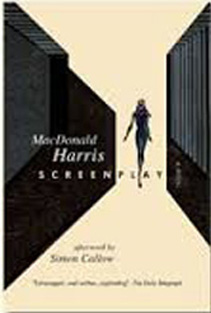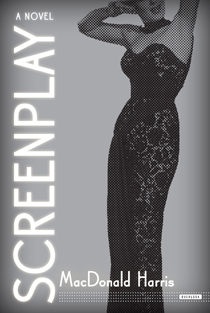Screenplay
by MacDonald Harris.
New York: Atheneum Publishers, 1982. Also London:
Jonathan Cape, 1983; London, Galileo Publishers, 2014.



From the Jacket:
In his new novel, the author of Herma displays another aspect of
his delightfully unlimited imagination, this time with a time-machine
voyage back to the Hollywood of the Twenties.
The time-traveler is the wealthy young dilettante Alys, who accepts the
invitation of a stranger to "get you into pictures" and suddenly
finds himself behind the move screen in the black-and-white
world we see in the Silents--a Los Angeles precisely as it was
sixty years ago, where love is the only subject matter but
passion can be expressed only within the censor's strict limits, where neither love
nor death can last beyond the moment when the director
says "Print that!" Alys's love for the glamorous and elusive Moira
Silver leads him inevitably to want to break out of this artificial
world with her, back to the garishly colorful Los Angeles of
our own time.
Screenplay is a novel as hauntingly erotic as
it is brilliantly imaginative--a mysterious and
captivating novel that, while unique in itself, shares
the magic of John Fowles's The Magus, Nabakov's
Pale Fire, and Jack Finney's
Time and Again.
Critical Acclaim for Screenplay:
- "Screenplay is one of the most haunting books
I have read in a long time...Harris is ever in control of his material as the story
progresses with the logic of dreams, and with their strangely predictable
shocks of recognition, their symbolic furnishings. Yet woven into
the archetypal longings of Alys's dream are the illusions of
our common, collective false dreams--the movies."
Dorothy Bryant, The San Francisco Chronicle.
- "Unlike most fantasies, or at least most novels that have more to do
with fantastic concepts, even fantastic erotic concepts, than with
people, Screenplay grows on you. MacDonald Harris is a gifted
craftsman, a meticulous writer whose pwoers as a storyteller are as compelling
as the sexual tensions he imagines.
Elliot Anderson, Chicago Tribune Book World.
- "Through the looking-glass to the Wonderland of early
film-making, in an erotic witty cruise among the layers of
art and reality."
Oakley Hall
- "Delicate and powerfully haunting, this Orpheus and
Euridice story is set in the wonderworld
of silver, ebony, and silence, guarded not by a
looking-glass but by the movie screen. Harris brilliantly re-romances
cinema romance in a glaringly lit distopia, a Shangri-la of
Shangri-las, where censored sexuality returns with all th e
urgency of the repressed."
John Hollander.
Return to Harris/Heiney publications page





